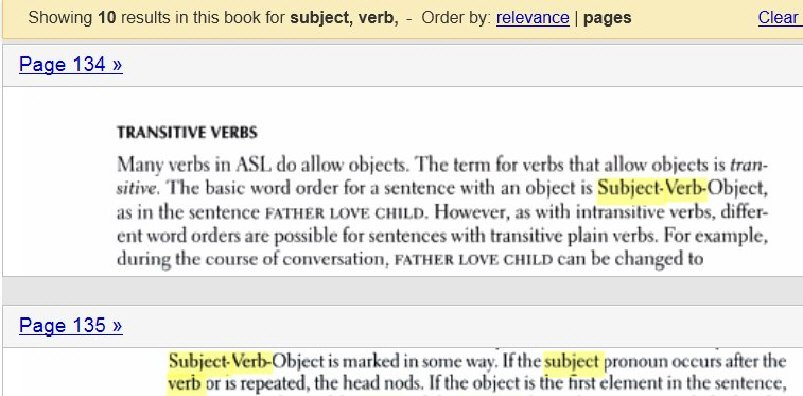American Sign Language: Grammar (8)
Grammar links: 1 | 2 | 3 | 4 | 5 | 6 | 7 | 8 | 9 | 10 | 12 | 13 | 14 | Also see: Inflection
QUESTION:
CJ writes:
I have a quick question. I was discussing with my friends about ASL grammar, she was upset with how I signed when is your birthday.
I signed: WHEN YOUR BIRTHDAY WHEN
She said it should have been according to OSV rule: WHEN BIRTHDAY YOUR WHEN
I told her that didn't make sense, is there a grammar page dealing with OSV rule on your website? I have been looking all over and I must be blind if I missed it.
Thanks,
--Charles "CJ" Johnson--
CJ,
No need to mess around -- bring out the big gun:
Linguistics of American Sign Language: An Introduction (5th edition) (See page 134).
According to the good doctors at Gallaudet (and elsewhere) the typical signing order for sentences (that have objects) is actually SVO. (I kid you not.)
Sure, we "topicalize" things from time to time (OSV), but it is for emphasis and or to introduce a new topic into the conversation while seeking to determine the conversation partner's familiarity with that topic so as to reduce the amount of back-story we need to produce. "OSV" is a tool in your box. That's all. And it isn't meant to be the "most" used tool eitther.
See: http://lifeprint.com/linguistics/topicalization.htm
Also, I'll paste below a screen capture of the relevant paragraph from the LASL books (hat tip to "Google Books").
Personally I would just sign YOU BIRTHDAY WHEN? (Which could be thought of as meaning: "You experience a birthday when?") [Sort of like YOU NAME WHAT? means "You are called what?" or You are named what?], or you could sign YOUR BIRTHDAY WHEN? (I probably even have that on my website).
I personally wouldn't use WHEN twice in that sentence (as you did in your example."
Putting a "WH" question at the end is typical of medium or longer sentences.
Short little sentences often don't need to. For example "WHO GO?" -- for "Who is going?" I'd never (freaking never) sign "GO WHO?"
Best wishes.
- Dr. Bill
NEW! Online "ASL Training Center!" (Premium Subscription Version of ASLU) ** CHECK IT OUT **
Also available: "ASLUniversity.com" (a mirror of Lifeprint.com less traffic, fast access) ** VISIT NOW **
